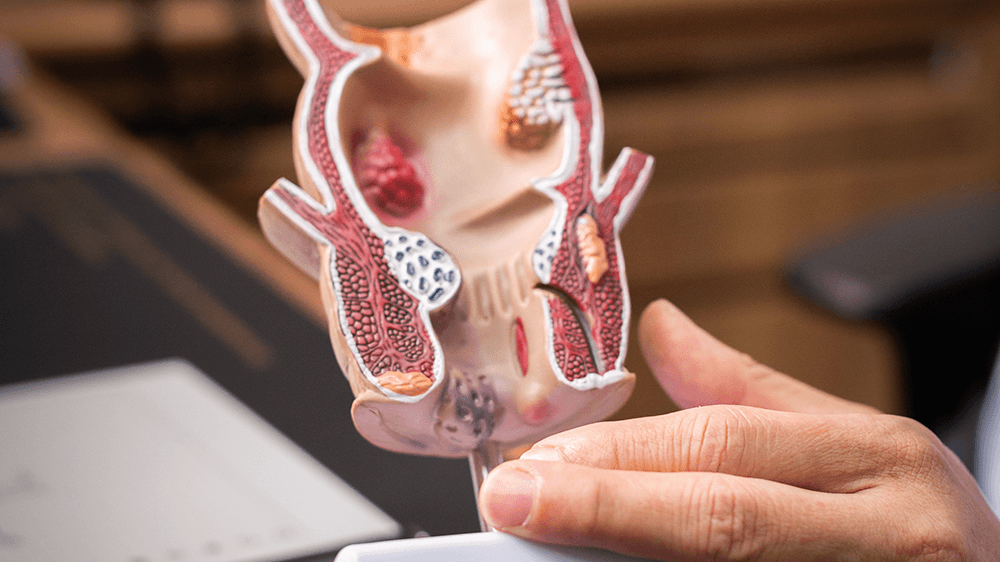Hemorrhoids (Piles)
Beyond common beliefs
Friday, October 18, 2024
If you're dealing with hemorrhoids, you're not alone. This condition affects one in three Singaporeans. Let's explore some common beliefs about hemorrhoids and shed light on modern treatment approaches.
Addressing common perceptions
Many people believe that hemorrhoids:
Only affect those with constipation
Requires painful surgery
However, reality is more nuanced. Hemorrhoids can affect anyone at any age, and treatment options have evolved significantly in recent years.
Common questions
Will I get hemorrhoids during pregnancy?
Hemorrhoids are a common occurrence during pregnancy, affecting many expectant mothers. Several factors contribute to their development:
Increased pressure on the pelvic veins from the growing uterus makes the veins more likely to become swollen and inflamed, leading to hemorrhoid formation.
Pregnancy-related hormonal changes can make the veins more susceptible to swelling and cause the walls of the veins to relax, increasing the likelihood of hemorrhoids developing.
Constipation, which is also common during pregnancy, can worsen hemorrhoid symptoms by causing additional strain during bowel movements.
If you already have hemorrhoids, you may notice them becoming more problematic as your pregnancy progresses. However, there are several ways to manage and prevent hemorrhoids during pregnancy:
Stay active and avoid prolonged sitting
Use doctor-approved stool softeners to prevent constipation
Maintain proper hydration and a fiber-rich diet
Consider medicated creams or ointments after consulting with your healthcare provider
The good news is that for most women, hemorrhoid symptoms typically improve after delivery. Always consult your healthcare provider before starting any new treatments during pregnancy.
Does physical exercise and weight lifting cause hemorrhoids?
Physical exercise and strength training are beneficial for overall health and typically don't cause hemorrhoids when performed correctly. However, certain factors during exercise can increase your risk:
Improper lifting techniques, especially during heavy weightlifting, can create excessive pressure on your pelvic blood vessels. This increased pressure may lead to hemorrhoid formation by causing congestion in the hemorrhoidal tissue.
Poor breathing and bracing techniques during weight training can direct unnecessary strain to your pelvic floor and rectal area, potentially contributing to hemorrhoid development.
Exercise-related dehydration can lead to constipation, and the resulting straining during bowel movements may cause hemorrhoids to form or existing ones to worsen.
To minimize your risk while staying active:
Learn and maintain proper form during weight training exercises
Stay well-hydrated before, during, and after workouts
Maintain a balanced, fiber-rich diet to prevent constipation
Practice correct breathing and bracing techniques during lifting
Listen to your body and avoid straining beyond your capabilities
The importance of specialised care
As haemorrhoids are vascular cushions, their size can vary for a variety of reasons. Consequently, they will seem to improve with lifestyle changes and over-the-counter treatments. However, improvement is short-lived in some instances. In such situations or when hemorrhoids are persistent or severe, expert evaluation may be of benefit.
Here's why:
Accurate diagnosis: What seems like hemorrhoids could be a sign of another condition. A colorectal specialist can provide a precise diagnosis.
Tailored treatment plans: Every patient's situation is unique. A specialist can offer a personalised approach, considering factors like the severity of your condition and your overall health.
Access to advanced techniques: Modern colorectal surgery has made significant strides. Multiple different treatment modalities are not available, offering faster recovery times and less discomfort than traditional surgical approaches.
When to seek specialised help
Consider consulting a colorectal specialist if you’re experiencing:
Persistent symptoms despite home remedies
Recurrent haemorrhoid flare-ups
Frequent bleeding during bowel movements
Significant pain or discomfort
Early intervention by a skilled specialist can prevent complications and provide faster relief.
Looking ahead: your path to relief
Living with haemorrhoid discomfort isn’t something you have to accept. With the right care, you can look forward to:
A thorough evaluation of your condition
A treatment plan tailored to your specific needs
Access to the latest, most effective treatment options
Comprehensive care that considers your overall well-being
Ready to take the next step? Contact us to learn more about advanced haemorrhoid treatments and to schedule a consultation.
